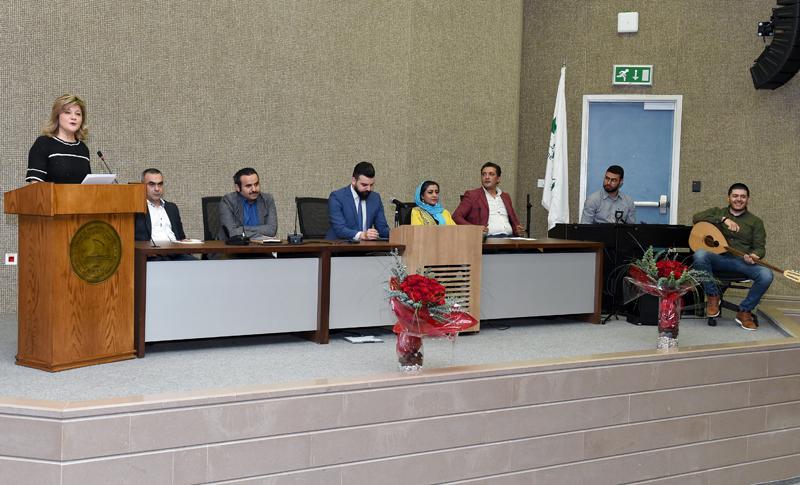Poetry, the Embodiment of Beauty

In homage to love in its many forms, the Department of Humanities organized a poetry reading – الشمس قبعة العاشق (The Sun is the Lover’s Core) – that featured five poets from Saudi Arabia and Lebanon on February 21 at the Gilbert and Rose-Marie Chagoury Health Sciences Center Auditorium, LAU Byblos campus.
Event organizer Associate Professor of Arabic Literature Nidale al-Amyouni Daccache introduced the poets, describing them as “heroes of these times, when people are opposed to poetry and when no one reads poetry or understands it.”
She asked students to savor the beauty of poetry and love, telling them that it was “a sin not to love poetry.”
Daccache also stressed the roles of educators in getting the young generation to appreciate poetry and to become more engaged in it.
“It should start as early as school. When you introduce students to poetry, they will start to love it more and more. And this is what our university is doing through communication skills, because poetry is not merely about words, it is also about intellect.”
The poets – Rabab Ismail and Saleh Zamanan from Saudi Arabia, and Bilal al-Masri, Ali Hamam and Hadi Mourad from Lebanon – read selected poems from published works, accompanied by LAU student musicians on the piano and the buzuq.
Each poet’s distinctive style transported the audience to a different realm. Themes varied from the confines of a psychiatric hospital to the inevitable march of time, from a mother’s love for her child to a lamentation of the destruction of nature.
For Mourad, who graduated from LAU with a degree in Psychiatry, poetry is more than just a passion but also a form of therapy for his patients.
“In the US and other countries, art is being used as a form of therapy for psychiatric patients, and includes music therapy, drama therapy and painting therapy. So, I thought, why don’t I use poetry in the same way,” he said.
Mourad says he noticed his patients’ positive reaction to the art form. “We see how relaxed they become when they listen to or write poetry,” he said, noting that he selected specific poems for each patient. “I try to tell them that you are not alone in what you are experiencing, many people passed through this and got over it,” he added.
For Saudi poet Ismail, her art is the embodiment of beauty. “Any painting you see, its beauty is poetry. Poetry is this inner feeling that exists in each and every one of us, but it takes the form of words.” She said that the younger generation is becoming drawn to poetry because of the difficult times the Arab region is experiencing. “We are living in one of the most painful times, and there is no medium of expression more capable of capturing this pain and transforming it into beauty.”
The event drew a crowd of students, many of whom are taking courses in Arabic literature or modern Arabic poetry.
Senior Architecture student Lara Wehbe said that poetry is something she has been passionate about since she was a child. “I am used to reading poetry from a very young age. My father loves it, and I was surrounded by poetry books. I enjoyed today’s reading very much,” she said.
Ahmed Mansour, also a senior Architecture student, said he is drawn to poetry because it “expresses the depths of human emotions in beautiful images.”